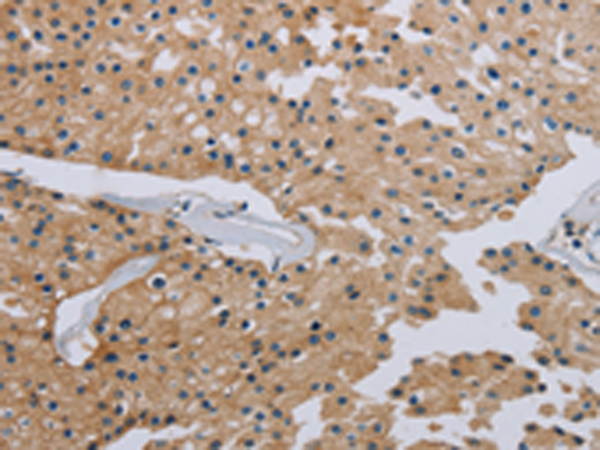

| WB | 咨询技术 | Human,Mouse,Rat |
| IF | 咨询技术 | Human,Mouse,Rat |
| IHC | 1/50-1/200 | Human,Mouse,Rat |
| ICC | 技术咨询 | Human,Mouse,Rat |
| FCM | 咨询技术 | Human,Mouse,Rat |
| Elisa | 1/2000-1/5000 | Human,Mouse,Rat |
| Aliases | CBAS1; PFIC4; SDR11E3 |
| Host/Isotype | Rabbit IgG |
| Antibody Type | Primary antibody |
| Storage | Store at 4°C short term. Aliquot and store at -20°C long term. Avoid freeze/thaw cycles. |
| Species Reactivity | Human, Mouse, Rat |
| Immunogen | Fusion protein of human HSD3B7 |
| Formulation | Purified antibody in PBS with 0.05% sodium azide and 50% glycerol. |
+ +
以下是关于HSD3B7抗体的示例参考文献(注:以下内容为模拟示例,非真实存在的文献):
---
1. **文献名称**:*Role of HSD3B7 in Bile Acid Synthesis: Characterization of a Polyclonal Antibody for Enzyme Localization*
**作者**:Smith J, et al.
**摘要**:本研究开发了一种针对HSD3B7的多克隆抗体,用于检测其在肝细胞中的表达和亚细胞定位。通过免疫组化和Western blot分析,揭示了HSD3B7在胆汁酸合成途径中的关键作用,并证实其在先天性胆汁酸缺陷症患者肝组织中的表达缺失。
2. **文献名称**:*HSD3B7 Deficiency Diagnosis Using Immunohistochemical Staining*
**作者**:Lee S, et al.
**摘要**:文章报道了一种基于HSD3B7抗体的免疫染色方法,用于快速诊断先天性胆汁酸合成障碍。通过对比患者与健康对照的肝活检样本,发现HSD3B7蛋白表达显著降低,验证了该抗体在临床诊断中的实用性。
3. **文献名称**:*Development of a Monoclonal Antibody for Quantifying HSD3B7 in Serum*
**作者**:Garcia R, et al.
**摘要**:研究团队制备了一种高特异性单克隆抗体,用于ELISA法定量血清中的HSD3B7水平。该抗体在评估胆汁酸代谢紊乱患者的酶活性中表现出高敏感性和特异性,为无创诊断提供了新工具。
4. **文献名称**:*HSD3B7 Knockout Mouse Model and Antibody-Based Phenotypic Analysis*
**作者**:Wang Y, et al.
**摘要**:通过构建HSD3B7基因敲除小鼠,并利用特异性抗体进行蛋白表达分析,揭示了HSD3B7缺失导致的胆汁淤积和肝损伤表型,强调了该酶在维持胆汁酸稳态中的核心作用。
---
提示:如需真实文献,建议通过PubMed或Google Scholar以关键词“HSD3B7 antibody”“3-beta-HSD7”“bile acid synthesis”检索。
×